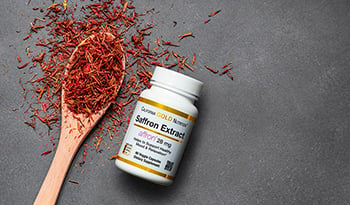Why Stress Support Supplements Are Getting More Popular

We live in a stressful world. There's no way to deny it. With devastating pandemics, looming threats, economic crises, strained relationships, and unrest, many individuals find it harder to get the rest needed.
Unfortunately, many adults now report more overwhelming stress and worry than in previous years.
With many individuals admitting to experiencing extreme stress levels and worry, it should be no surprise that stress support supplements have seen a considerable boost in popularity over the last few years.
Why would this be? One multinational study conducted by the World Health Organization showed that stress levels among adults were considerably higher due to the impact of the pandemic on finances, relationships, and health than in previous years in which no pandemic occurred.
This translated into an increase in the amount of stress-supporting supplements people were taking. In 2020, stress-supporting supplement sales soared by 44% in the United States, 60% in France, and a whopping 63% in the United Kingdom.
Another reason for the increased popularity of stress support supplements is the potential positive effects that many can provide, like anti-aging properties, increasing longevity, and reducing the symptoms of stress and worry.
Many supplements for stress support contain ingredients like L-theanine, magnesium, L- tryptophan, lavender, vitamin B6, and adaptogens like ashwagandha and Rhodiola. These specific vitamins, minerals, herbs, and amino acids may be beneficial for improving and reducing the effects of stress on the body.
L-Theanine
L-theanine is a non-protein water-soluble amino acid that is naturally found in tea. Studies show that L-theanine may help to reduce the symptoms of psychological stress. For example, a 2019 double-blind, randomized, placebo-controlled study showed that participants who took L-theanine had better mental function and sleep compared to placebo.
Another study done in 2020 found that L-theanine may help reduce stress and anxiety in those exposed to stressful conditions and situations.
L-theanine may also help to promote longevity by decreasing inflammation. One 2021 study showed that L-theanine supplementation increased interleukin-10 levels (an anti-inflammatory cytokine or cell messenger) in the blood of athletes.
Many different supplements for stress support include L-theanine precisely because of its potential to reduce the symptoms of stress.
Magnesium
Magnesium is the fourth most abundant mineral in the body and is needed to perform over 300 enzymatic relations.
Magnesium supports healthy bones, protein synthesis, proper functioning of muscles and nerves, and blood pressure regulation. This mineral is critical for optimal health. While magnesium plays many crucial roles in the body, it may also provide benefits for improving the symptoms of stress and anxiety.
For example, a 2018 study showed improvement in symptoms of stress and anxiety in healthy adults who had low serum magnesium and were supplemented with magnesium.
A 2017 study showed that adults suffering from depression and symptoms of Generalized Anxiety Disorder might find some relief from stress and worry while supplementing with magnesium.
L-tryptophan
L-tryptophan is an amino acid that is essential for life. This means that the body can't make L-tryptophan, which needs to be obtained from diet and/or supplementation.
L-tryptophan is used for the creation of new proteins and the synthesis of melatonin and serotonin. Melatonin is widely known as the sleep hormone because of how it promotes healthy and restful sleep while balancing your circadian rhythm.
On the other hand, serotonin is a neurotransmitter that plays key roles in cardiovascular function, bladder control, and bowel motility, among other things. Although serotonin is critical for many different bodily functions, many people describe it as the "feel good" neurotransmitter because of the potential to bring about a calmer, happier state.
A 2021 study examined the effects of L-tryptophan intake on mood in healthy adults. This study found that L-tryptophan intake may decrease negative emotions and anxiety while increasing positive feelings.
Conversely, low levels of L-tryptophan intake have been linked to low mood, impaired memory, and even feelings of aggression.
Some animal studies suggest that L-tryptophan acts as an anti-aging supplement that prevents age-related cognitive decline by avoiding the loss of serotonin neurotransmitters in the brain.
Lavender
Lavender is a beautiful fragrant purple herb that may also possess anti-anxiety and stress properties.
A 2019 meta-analysis, a statistical analysis combining the results of many studies, found that lavender may reduce anxiety symptoms in two distinct ways: inhaling lavender essential oil and oral intake of specially prepared lavender supplements.
Lavender may also benefit depression and Generalized Anxiety Disorder (GAD). For example, a 2014 study showed that individuals who took a special oral preparation of lavender found some relief from the symptoms of GAD and depression. The study participants also described a more generalized improvement in their mental health and well-being.
Vitamin B6
Pyridoxine, or vitamin B6, is a water-soluble vitamin essential for carbohydrate and fat metabolism, proper immune function, and cognitive function through synthesizing neurotransmitters.
Studies suggest vitamin B6 is also vital for maintaining a positive mood. One 2018 study found that older adults with low vitamin B6 status also experienced depression.
Another study done in 2017 found that supplementing with vitamin B6 may improve anxiety symptoms in older women.
Studies suggest that vitamin B6 supplementation may help prevent postpartum depression in high-risk women.
Vitamin B6 is important when managing stress, which is why many stress support supplements include vitamin B6.
Adaptogens
Adaptogens are substances that help improve the body's response to stress by increasing resistance to stress and making the body less sensitive to stressors.
Adaptogens are usually, but not always, herbs like ashwagandha and Rhodiola. Studies show that these herbs may provide great benefits when it comes to supporting the body in stressful situations.
For example, a 2019 study found that participants taking ashwagandha had a reduction in the severity of their symptoms of depression, anxiety, and stress compared to those taking a placebo.
A 2015 study that separated individuals suffering from mild anxiety into two groups, a control, and a group that used Rhodiola, found that the group who had used Rhodiola had improvement in symptoms of depression, anxiety, stress, anger, and confusion. The placebo group did not appear to experience any of these changes.
Research suggests that adaptogens may be key in improving the body's response to stress.
Moving Forward
The world seems to be more stressful each day. With an ever-increasing number of responsibilities and the feeling that our world may not be as safe a place as we thought, stress and worry can be a constant struggle.
Stress-supporting supplements give you the boost you need to help manage stress and worry.
References:
- Most Americans Report Overwhelming Stress Levels: Poll. WebMD. https://www.webmd.com/anxiety-panic/news/20220310/americans-report-overwhelming-stress-poll. Published 2022. Accessed June 30, 2022.
- Adamson MM, Phillips A, Seenivasan S, et al. International Prevalence and Correlates of Psychological Stress during the Global COVID-19 Pandemic. Int J Environ Res Public Health. 2020;17(24):9248. Published 2020 Dec 10. doi:10.3390/ijerph17249248
- Lordan R. Dietary supplements and nutraceuticals market growth during the coronavirus pandemic - Implications for consumers and regulatory oversight. PharmaNutrition. 2021;18:100282. doi:10.1016/j.phanu.2021.100282
- Hidese S, Ogawa S, Ota M, et al. Effects of L-Theanine Administration on Stress-Related Symptoms and Cognitive Functions in Healthy Adults: A Randomized Controlled Trial. Nutrients. 2019;11(10):2362. Published 2019 Oct 3. doi:10.3390/nu11102362
- Williams JL, Everett JM, D'Cunha NM, et al. The Effects of Green Tea Amino Acid L-Theanine Consumption on the Ability to Manage Stress and Anxiety Levels: a Systematic Review. Plant Foods Hum Nutr. 2020;75(1):12-23. doi:10.1007/s11130-019-00771-5
- Juszkiewicz A, Glapa A, Basta P, et al. The effect of L-theanine supplementation on the immune system of athletes exposed to strenuous physical exercise. J Int Soc Sports Nutr. 2019;16(1):7. Published 2019 Feb 15. doi:10.1186/s12970-019-0274-y
- Gröber U, Schmidt J, Kisters K. Magnesium in Prevention and Therapy. Nutrients. 2015;7(9):8199-8226. Published 2015 Sep 23. doi:10.3390/nu7095388
- Pouteau E, Kabir-Ahmadi M, Noah L, et al. Superiority of magnesium and vitamin B6 over magnesium alone on severe stress in healthy adults with low magnesemia: A randomized, single-blind clinical trial. PLoS One. 2018;13(12):e0208454. Published 2018 Dec 18. doi:10.1371/journal.pone.0208454
- Tarleton EK, Littenberg B, MacLean CD, Kennedy AG, Daley C. Role of magnesium supplementation in the treatment of depression: A randomized clinical trial. PLoS One. 2017;12(6):e0180067. Published 2017 Jun 27. doi:10.1371/journal.pone.0180067
- Richard DM, Dawes MA, Mathias CW, Acheson A, Hill-Kapturczak N, Dougherty DM. L-Tryptophan: Basic Metabolic Functions, Behavioral Research and Therapeutic Indications. Int J Tryptophan Res. 2009;2:45-60. doi:10.4137/ijtr.s212
- Kikuchi AM, Tanabe A, Iwahori Y. A systematic review of the effect of L-tryptophan supplementation on mood and emotional functioning. J Diet Suppl. 2021;18(3):316-333. doi:10.1080/19390211.2020.1746725
- Bell C, Abrams J, Nutt D. Tryptophan depletion and its implications for psychiatry. Br J Psychiatry. 2001;178:399-405. doi:10.1192/bjp.178.5.399
- Musumeci G, Castrogiovanni P, Szychlinska MA, et al. Protective effects of high Tryptophan diet on aging-induced passive avoidance impairment and hippocampal apoptosis. Brain Res Bull. 2017;128:76-82. doi:10.1016/j.brainresbull.2016.11.007
- Donelli D, Antonelli M, Bellinazzi C, Gensini GF, Firenzuoli F. Effects of lavender on anxiety: A systematic review and meta-analysis. Phytomedicine. 2019;65:153099. doi:10.1016/j.phymed.2019.153099
- Musumeci G, Castrogiovanni P, Szychlinska MA, et al. Protective effects of high Tryptophan diet on aging-induced passive avoidance impairment and hippocampal apoptosis. Brain Res Bull. 2017;128:76-82. doi:10.1016/j.brainresbull.2016.11.007
- Kasper S, Gastpar M, Müller WE, et al. Lavender oil preparation Silexan is effective in generalized anxiety disorder--a randomized, double-blind comparison to placebo and paroxetine. Int J Neuropsychopharmacol. 2014;17(6):859-869. doi:10.1017/S1461145714000017
- Arévalo SP, Scott TM, Falcón LM, Tucker KL. Vitamin B-6 and depressive symptomatology, over time, in older Latino adults. Nutr Neurosci. 2019;22(9):625-636. doi:10.1080/1028415X.2017.1422904
- McCabe D, Lisy K, Lockwood C, Colbeck M. The impact of essential fatty acid, B vitamins, vitamin C, magnesium and zinc supplementation on stress levels in women: a systematic review. JBI Database System Rev Implement Rep. 2017;15(2):402-453. doi:10.11124/JBISRIR-2016-002965
- Khodadad M, Bahadoran P, Kheirabadi GR, Sabzghabaee AM. Can Vitamin B6 Help to Prevent Postpartum Depression? A Randomized Controlled Trial. Int J Prev Med. 2021;12:136. Published 2021 Oct 19. doi:10.4103/ijpvm.IJPVM_240_19
- Lopresti AL, Smith SJ, Malvi H, Kodgule R. An investigation into the stress-relieving and pharmacological actions of an ashwagandha (Withania somnifera) extract: A randomized, double-blind, placebo-controlled study. Medicine (Baltimore). 2019;98(37):e17186. doi:10.1097/MD.0000000000017186
- Cropley M, Banks AP, Boyle J. The Effects of Rhodiola Rosea L. Extract on Anxiety, Stress, Cognition and Other Mood Symptoms. Phytother Res. 2015;29(12):1934-1939. doi:10.1002/ptr.5486
DISCLAIMER:This Wellness Hub does not intend to provide diagnosis...
















































































 Table of Contents
Table of Contents
















